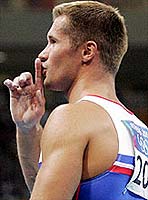The ordeal changed the tone of Olympic gymnastics that night. Smiling faces grew tense, as athletes who had no control over the situation were pitted against one another in an almost vicious atmosphere.
I awoke in the middle of the night and couldn't stop contemplating what I'd watched on television a few hours earlier. I know absolutely nothing about scoring gymnastics and my ideas probably seem naïve. But in the middle of the night, it made perfectly good sense to think that the judges should watch replays of the routine in slow motion before giving their scores.
Since no one is interested in my ideas for scoring world-class gymnastic routines (after all ... I have never in my life been able to turn a cartwheel), my middle-of-the-night thoughts began to focus on what I could learn from all this.
To borrow from Shakespeare, life is a gymnastics competition and we're all Olympians. Many times we're going about our routine trying to make the best of our life-long training, hoping to make our coaches proud, only to be hammered down by swift and overly critical judgment.
How we wish we could show our judges the whole routine in slow motion, explaining why we had a little difficulty here and there ... pointing out our pulled hamstring and how we've overcome the pain to continue on ... and asking for bonus points when we gracefully transitioned through a tricky turn. Maybe we don't deserve the gold, but we want our judges to be fair.
From listening to the commentary during gymnastic competition, I've learned that it's usually a bad sign if the judges are taking too long to post the scores. This is where my analogy falls apart. In life we're usually hurt the most when judges rush to make decisions.
Do you, like me, ever have these epiphanies in the wee hours of the morning? This analogy seemed so incredible at 2:00 a.m. I wanted to get out of bed and type it up, but a delightful irony kept me from doing so! I have a head cold, so I'd taken a decongestant before falling asleep. It was doing the trick and keeping me too sluggish to move. I had to grin as I thought how some might rush to judgment and call me lazy for not writing my thoughts down when they were so wonderfully vivid to me. But, this made the whole scenario fit together perfectly. That kind of judgment would be too quick and too critical.
You judge by human standards; I pass judgment on no one. But if I do judge, my decisions are right, because I am not alone. I stand with the Father, who sent me. (John 8:15-16 NIV)






Comments
Have thoughts on this article? Leave a comment